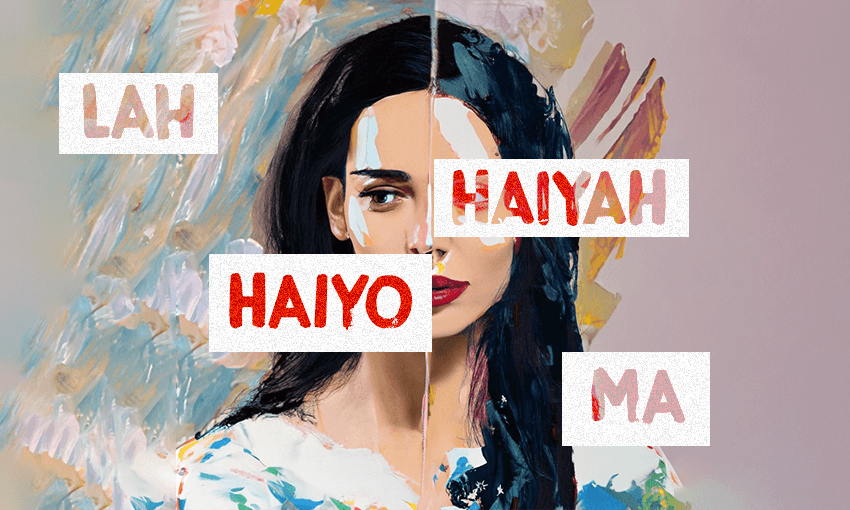For some people, I sound too Malaysian. For others, not Malaysian enough.
The Sunday Essay is made possible thanks to the support of Creative New Zealand.
I am in the heart of Kuala Lumpur at a bustling food hall, ordering a plate of char kuey teow for $3. I have just arrived, and the first thing I want to do is eat the local hawker food I have desperately missed.
“Uncle, can I order one char kuey teow, please, extra char boleh?”
He looks at me and smiles. “You nak seafood today or not?”
“No lah uncle, just chicken today, thank you.”
He adds eggs and flat noodles into his seasoned wok and begins cooking. I take in my surroundings. Conversations flow around me in Tamil, Cantonese, Hokkien, Malay, and Manglish. I breathe in the thick, humid air and enjoy the fact that I am sitting in a multi-lingual space. It is good to be back.
Just days ago, if I had ordered the same dish in a Malaysian restaurant in Tāmaki Makaurau, I would have spoken in what some would call “proper English” using my Kiwi-Malaysian accent. I would not have used any Malay words or cultural slang in my speech, and my sentence structure would have been different. This alteration to my speech is not new. I have been learning and practising using two accents and speaking colloquial English – Manglish – since I was a six-year-old Kiwi kid experiencing culture shock when I left Christchurch and came to live in Malaysia.
When I first moved to Malaysia, unlike my peers, there was no “lah”, “ma”, “dei”, “haiyah” or “haiyo” colouring my vocabulary yet. I felt like a “coconut” – brown on the outside and culturally western on the inside – and I was conscious of not fitting in. I needn’t have worried, though: through attending public school, I quickly learned Malaysia’s national language, Malay, which turned me from monolingual to bilingual. Becoming fluent in a second language also altered my accent, and being surrounded by a melting pot of cultures further changed how I spoke my first language, English.
A couple of years before I returned to Aotearoa to further my studies, my mother, noticing my increasing use of Manglish, worriedly told me, “You must speak in clear British English, not English with ‘ma’, ‘la’, ‘haiyo’ and ‘haiya’. How are you going to be accepted in New Zealand when you talk this way?” I heard her, but I didn’t feel the need to heed her advice. I did not see anything wrong with the way I spoke. In fact, I thought it was cool. I loved that my English was coloured with words from other languages, and I enjoyed conversing in English and Malay, or both if I felt like it.
Only when I returned to Aotearoa did I understand her point and become cognisant of my accent and how I spoke. I stood out, but in a different way than when I was a child trying to fit into Malaysia. Now, I was required to assimilate and adapt to New Zealand’s societal expectations, and those very definitely did not include speaking in the way I was used to in Malaysia. I’d hear elderly migrants apologising at shops for their poor English, self-conscious of their accents. I quietly observed medical receptionists being rude to people coming in with heavy accents and conversing in limited English. “I just can’t understand what this person is saying,” one receptionist would exclaim in frustration to their colleague while the patient would stand there, embarrassed, just wanting to get in and see a doctor. When it was my turn, I’d go up and speak in the clearest, most Kiwi way possible, hoping they would smile at me. A big part of me wanted their approval.
I quickly became aware that the combination of my long name, skin colour, and using a full-blown Malaysian accent would not do me any favours, let alone speaking Manglish. And so I began code switching: changing my accent and pronunciation when conversing to suit the Kiwi way of talking, and then switching back to a Malaysian way of speaking when I’d go back to visit my parents and family in Malaysia. I even started introducing myself as Abby to avoid explaining how to pronounce my name to new acquaintances multiple times. I had two identities and two voices that would, over time, automatically switch depending on where I was.
I wasn’t learning the New Zealand accent from scratch. I slowly eased into a familiar yet distant way of conversing and hoped that sounding more Kiwi would help me fit in faster. Despite my deliberate accent, I was still asked more times than I was comfortable with if my parents spoke English and if I grew up in an English-speaking home. “Your English is so good,” some would remark, surprised that I could string a sentence together. These questions about my mother tongue, along with the “where are you from?” question, were not often asked in a spirit of genuine curiosity.
People around me had their own opinions, too, which fed into my continual code switching. An acquaintance, questioning my accent, asked in an accusatory tone, “Why don’t you sound Malaysian?” I laughed it off but felt defensive, upset and confused.
I had these mixed feelings because I have two places I call home, and before I knew the words for what I was experiencing, I had to adapt and assimilate to these very different environments. The people-pleaser side of me also kicked in: much like how I wanted to please the receptionists at the doctor’s, I wanted to give this person an answer that satisfied her. I knew she wanted me to tell her I was putting on an accent, to somehow get me to admit that I was either not Malaysian enough or not Kiwi enough for her.
In reality, although my first language was English and my first accent was Kiwi, my Malaysian accent and fluency in Malay speak to both my schooling in Malaysia and the culture my family has lived in for over a century. Why did my acquaintance want to reduce me to “not sounding Malaysian”, rather than truly seeing the complexity of the influences that inform my identity?
Her way of thinking was echoed by social media videos of influencers “humorously” imitating the way Hollywood celebrities of South Asian descent pronounce their names. I was unsurprised to read the comments section filled with criticism for “sounding white while being brown”. If a person has grown up across different cultures, and both inform who they are, surely they can embrace this, regardless of the court of public opinion?
When I see exclusionary comments on news articles in Aotearoa talking about how “we” should only speak English, not te reo or any other language, I take a deep breath. I never learned to fluently speak my mother tongue, Tamil, and this makes me feel disconnected from my heritage and roots. Growing up, people would look at me and then at my parents in shock, saying, “She can’t speak Tamil?! But this is who she is!” I didn’t even know who I was, and hearing opinions like these created more self-doubt.
This is all the more reason for me to respect the languages and the accents that come with different cultures and wholly embrace the indigenous language of this country. Although Kiwi English is a part of my identity, speaking in this way is also about surviving and being accepted. I think about my parents and the people before them who had to do the same. Perhaps this is why my mother, who wanted the best for me, told me to speak in “clear British English”.
Today, while walking my dog, I had a tourist stop me. I wondered if it was because I was using a rock climbing harness as a hands-free walking tool for my energetic border collie, who was looking up at me whining loudly, wanting to be let off to run. Or maybe it was the white cast of the sunblock on my face, making me look like a floating, ghostly head on a dark brown body.
The tourist approached me and said, “You look local?” to which I nodded, yes, I am. He told me he was on holiday and looking for recommendations for cafes and walks around my area. We talked a bit more, and I said I found it odd that he was in my neighbourhood, considering all of the other interesting places he could be while visiting Tāmaki Makaurau for a few hours. I asked him where he was travelling to next. “Home,” he replied. He paused, then continued. “I have a Canadian accent, but I live in Australia. Long story.”
I rattled off a list of cafes and walks. He looked at me and said, “You sound Kiwi, but there are words in your speech where you don’t sound Kiwi. What is that accent?” He was asking in a genuine, kind, “I’ve been there” sort of way. “It’s a hybrid between Kiwi and Malaysian,” I replied. He nodded, smiled, then chatted to me for a while about his trip in Aotearoa. He thanked me, then headed off to his car.
I looked down at my dog. “Let’s go home lah,” I said.

